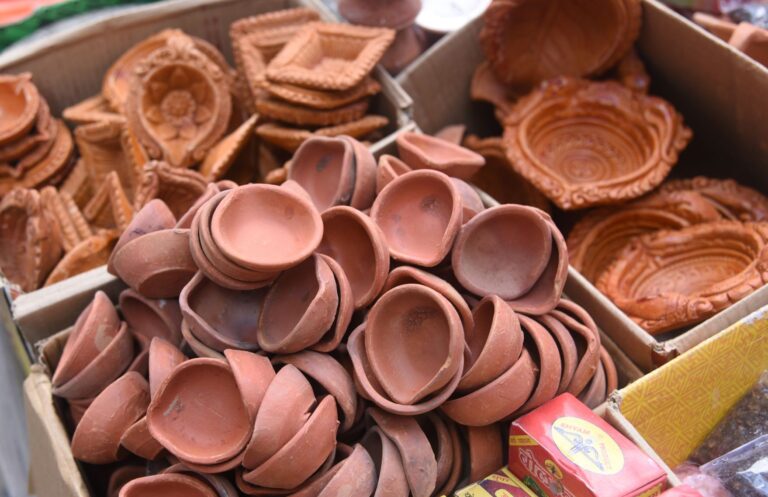
Bhaktapur’s Prajapati community is finding it hard to meet the demand for traditional earthen lamps locally known as ‘Pala’ when the Tihar, the festival of lights, has already arrived. Pottery is the ancestral profession of the Prajapati community.
Bolachhe and Pottery Square at Tala in Bhaktapur and Nagdesh, Bode, Chapacho and Pancho in Madhyapur Thimi Municipality are known traditional pottery villages in the district.
The Prajapati community here is currently excessively busy commercializing clay arts they inherit from their ancestors in view of the Tihar festival.
Binod Kumar Prajapati of Pottery Square feels more pressure to meet the demand for traditional clay pots, especially for the Pala (clay lamp), during the festivals mainly the Tihar. “Demands for Pala, Bhiunt and Dhupauro are high and we are morally bound to meet the orders,” he said.
“This is the best and a peak season for thriving the pottery business so our entire family gets busy in making clay pots since the morning as we do not want to miss this golden opportunity,” he added.
He has already supplied 40,000 Pala this year. Demand for both large and small Pala is equally high.
Each member of 40 households in the Pottery Square is presently seen engaged in pottery-making activities. Some are giving the shape to pots, some are baking the pots in the chimney, some are seen busy in packing and are about to set out for the supplies of products.
Dayaram Prajapati of Pottery Square hardly gets time for a rest. He keeps himself engaged in pottery making throughout the day. He inherits this occupation from his ancestors.
The last two years were not encouraging for the pottery business due to the COVID-9 pandemic. But this time demand increased sharply, he said.
The earthen lamps and wares produced here are supplied to Bhaktapur, Kathmandu, Lalitpur, Kavre, Banepa, Panauti, Sindhupalchowk, Dhading, Nuwakot, Pokhara, and Narayangadh and even to Birgunj from where the demands have been placed, Binod said.
The cost of 100 units of pala (earthen lamp) was in the range from Rs 90 to Rs 110 until three years back. It has now increased and per unit wholesale price is Rs 2 while its retail price is Rs 4 per pala this year.
“We are facing a shortage of clay and wood. It would be much easier if the government could manage electric kiln for us, the potters,” Binod said.
According to him, it has been seven years since they have been facing a shortage of suitable clay in Bhaktapur. The traders bring the clay from Sankhu. Even the supply from Sankhu is inadequate. The potters here are worried their traditional profession is in crisis due to the shortage of suitable clay. Dayaram said the traders charged Rs 10,000 for a mini-truck of clay.
Likewise, the potters here are also grappling with a shortage of wood for burning to dry the manufactured clayware. “We have been using the wood collected from the debris and wreckage of the houses that collapsed during the 2015 Gorkha Earthquake as fuel to dry the clayware these days. We will be in trouble once we run out of the supply from this source,” Dayaram bemoaned.
Rujen Prajapati of Madhyapur Thimi, who also manufactures terracotta articles, said the potters of Bhaktapur are overwhelmed with demand from within the country as well as from abroad.
In the past, the potters from Bhaktapur used to go to places outside the district for manufacturing clay pots. Similarly, the local potters in outside districts also manufactured the clay pots to meet the local demand. But this tradition is in crisis these days.
However, the potters in Bhaktapur are very busy at present, thanks to the Tihar festival. Most of the male members of the community can be seen busy kneading the clay, readying it for making pots, manufacturing the pots and drying the manufactured pots in the furnace, while the womenfolk are busy drying the pots and painting them.
They have received orders for millions of pala from Kathmandu Valley as well as outside districts. The Prajapati community of Bhaktapur and Thimi are engrossed in making the clayware as pala, khutruke, ambara, dhupauro, surai, kalincha and flowerpots.
Tihar is also the time for the potters here to make some extra income, compensating their low income during the lean period of the year.
Source : RSS,






